Robinson Crusoe鲁滨逊漂流记人物分析
- 格式:doc
- 大小:28.50 KB
- 文档页数:3
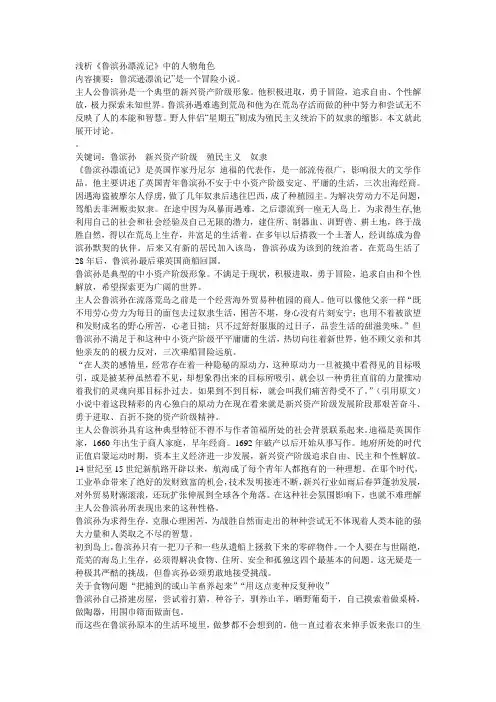
浅析《鲁滨孙漂流记》中的人物角色内容摘要:鲁滨逊漂流记”是一个冒险小说。
主人公鲁滨孙是一个典型的新兴资产阶级形象。
他积极进取,勇于冒险,追求自由、个性解放,极力探索未知世界。
鲁滨孙遇难逃到荒岛和他为在荒岛存活而做的种中努力和尝试无不反映了人的本能和智慧。
野人伴侣“星期五”则成为殖民主义统治下的奴隶的缩影。
本文就此展开讨论。
关键词:鲁滨孙新兴资产阶级殖民主义奴隶《鲁滨孙漂流记》是英国作家丹尼尔迪福的代表作,是一部流传很广,影响很大的文学作品。
他主要讲述了英国青年鲁滨孙不安于中小资产阶级安定、平庸的生活,三次出海经商。
因遇海盗被摩尔人俘虏,做了几年奴隶后逃往巴西,成了种植园主。
为解决劳动力不足问题,驾船去非洲贩卖奴隶。
在途中因为风暴而遇难,之后漂流到一座无人岛上。
为求得生存,他利用自己的社会和社会经验及自己无限的潜力,建住所、制器血、训野兽、耕土地,终于战胜自然,得以在荒岛上生存,并富足的生活着。
在多年以后搭救一个土著人,经训练成为鲁滨孙默契的伙伴。
后来又有新的居民加入该岛,鲁滨孙成为该到的统治者。
在荒岛生活了28年后,鲁滨孙最后乘英国商船回国。
鲁滨孙是典型的中小资产阶级形象。
不满足于现状,积极进取,勇于冒险,追求自由和个性解放,希望探索更为广阔的世界。
主人公鲁滨孙在流落荒岛之前是一个经营海外贸易种植园的商人。
他可以像他父亲一样“既不用劳心劳力为每日的面包去过奴隶生活,困苦不堪,身心没有片刻安宁;也用不着被欲望和发财成名的野心所苦,心老日拙;只不过舒舒服服的过日子,品尝生活的甜滋美味。
”但鲁滨孙不满足于和这种中小资产阶级平平庸庸的生活,热切向往着新世界,他不顾父亲和其他亲友的的极力反对,三次乘船冒险远航。
“在人类的感情里,经常存在着一种隐秘的原动力,这种原动力一旦被摸中看得见的目标吸引,或是被某种虽然看不见,却想象得出来的目标所吸引,就会以一种勇往直前的力量推动着我们的灵魂向那目标扑过去。
如果到不到目标,就会叫我们痛苦得受不了。
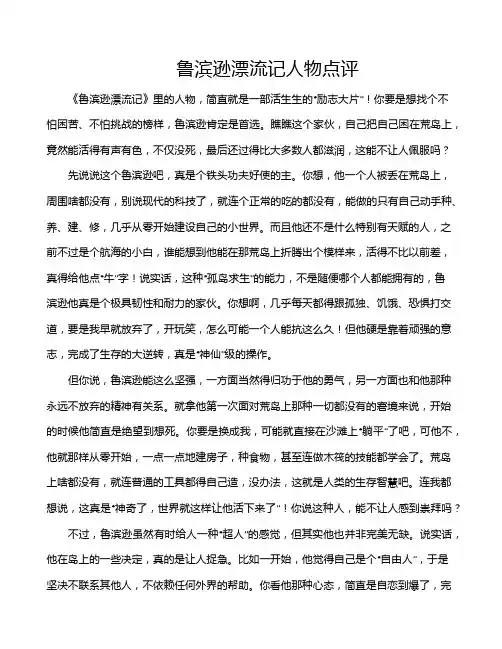
鲁滨逊漂流记人物点评《鲁滨逊漂流记》里的人物,简直就是一部活生生的“励志大片”!你要是想找个不怕困苦、不怕挑战的榜样,鲁滨逊肯定是首选。
瞧瞧这个家伙,自己把自己困在荒岛上,竟然能活得有声有色,不仅没死,最后还过得比大多数人都滋润,这能不让人佩服吗?先说说这个鲁滨逊吧,真是个铁头功夫好使的主。
你想,他一个人被丢在荒岛上,周围啥都没有,别说现代的科技了,就连个正常的吃的都没有,能做的只有自己动手种、养、建、修,几乎从零开始建设自己的小世界。
而且他还不是什么特别有天赋的人,之前不过是个航海的小白,谁能想到他能在那荒岛上折腾出个模样来,活得不比以前差,真得给他点“牛”字!说实话,这种“孤岛求生”的能力,不是随便哪个人都能拥有的,鲁滨逊他真是个极具韧性和耐力的家伙。
你想啊,几乎每天都得跟孤独、饥饿、恐惧打交道,要是我早就放弃了,开玩笑,怎么可能一个人能抗这么久!但他硬是靠着顽强的意志,完成了生存的大逆转,真是“神仙”级的操作。
但你说,鲁滨逊能这么坚强,一方面当然得归功于他的勇气,另一方面也和他那种永远不放弃的精神有关系。
就拿他第一次面对荒岛上那种一切都没有的窘境来说,开始的时候他简直是绝望到想死。
你要是换成我,可能就直接在沙滩上“躺平”了吧,可他不,他就那样从零开始,一点一点地建房子,种食物,甚至连做木筏的技能都学会了。
荒岛上啥都没有,就连普通的工具都得自己造,没办法,这就是人类的生存智慧吧。
连我都想说,这真是“神奇了,世界就这样让他活下来了”!你说这种人,能不让人感到崇拜吗?不过,鲁滨逊虽然有时给人一种“超人”的感觉,但其实他也并非完美无缺。
说实话,他在岛上的一些决定,真的是让人捉急。
比如一开始,他觉得自己是个“自由人”,于是坚决不联系其他人,不依赖任何外界的帮助。
你看他那种心态,简直是自恋到爆了,完全不考虑自己的实际情况。
要说他有点傲气也不为过。
甚至有时候他在荒岛上的决策,真是让人想捶自己胸口:你明明可以把自己生活安排得更好一点,为什么总是折腾呢?但你看,这也正是鲁滨逊的真实一面,虽有点“不知道天高地厚”,但他一直在努力突破自我,挑战极限,哪怕走了弯路。

(完整)Robinson Crusoe鲁滨逊漂流记人物分析编辑整理:尊敬的读者朋友们:这里是精品文档编辑中心,本文档内容是由我和我的同事精心编辑整理后发布的,发布之前我们对文中内容进行仔细校对,但是难免会有疏漏的地方,但是任然希望((完整)Robinson Crusoe 鲁滨逊漂流记人物分析)的内容能够给您的工作和学习带来便利。
同时也真诚的希望收到您的建议和反馈,这将是我们进步的源泉,前进的动力。
本文可编辑可修改,如果觉得对您有帮助请收藏以便随时查阅,最后祝您生活愉快业绩进步,以下为(完整)Robinson Crusoe鲁滨逊漂流记人物分析的全部内容。
The Characters of the Emerging bourgeoisie revealed in Robinson CrusoeAbstract: Robinson Crusoe, based on a real fact, successfully creates a hero, an empire builder, and a super man. The author Defoe, because of this book, becomes the father of English realistic novel. People like to talk about Robinson Crusoe, with his adventure and everything he had done when he was facing the obstacles。
To some people, Robinson is a hero,a giant, and perfect in all aspects。
While some other people think that Robinson is the one who struggles only for property。
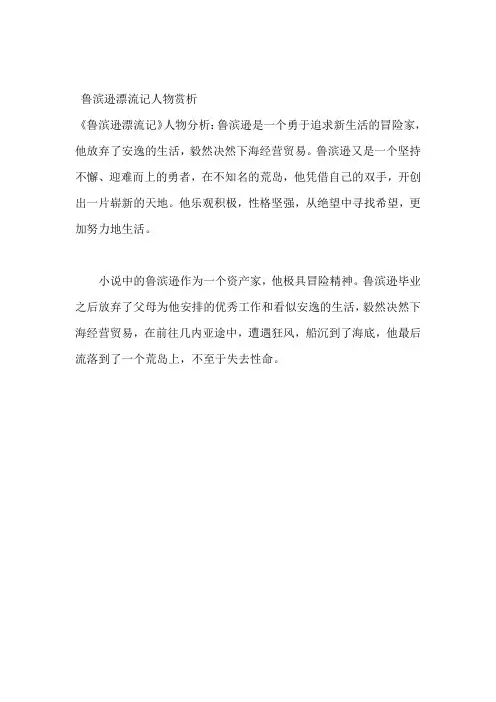
鲁滨逊漂流记人物赏析
《鲁滨逊漂流记》人物分析:鲁滨逊是一个勇于追求新生活的冒险家,他放弃了安逸的生活,毅然决然下海经营贸易。
鲁滨逊又是一个坚持不懈、迎难而上的勇者,在不知名的荒岛,他凭借自己的双手,开创出一片崭新的天地。
他乐观积极,性格坚强,从绝望中寻找希望,更加努力地生活。
小说中的鲁滨逊作为一个资产家,他极具冒险精神。
鲁滨逊毕业之后放弃了父母为他安排的优秀工作和看似安逸的生活,毅然决然下海经营贸易,在前往几内亚途中,遭遇狂风,船沉到了海底,他最后流落到了一个荒岛上,不至于失去性命。
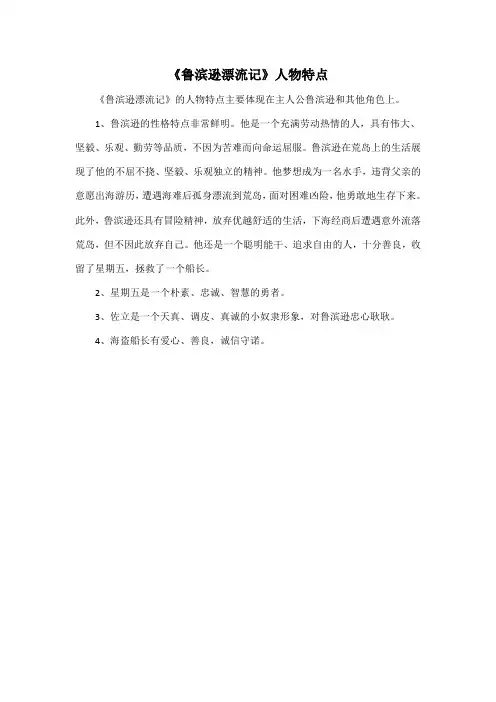
《鲁滨逊漂流记》人物特点
《鲁滨逊漂流记》的人物特点主要体现在主人公鲁滨逊和其他角色上。
1、鲁滨逊的性格特点非常鲜明。
他是一个充满劳动热情的人,具有伟大、坚毅、乐观、勤劳等品质,不因为苦难而向命运屈服。
鲁滨逊在荒岛上的生活展现了他的不屈不挠、坚毅、乐观独立的精神。
他梦想成为一名水手,违背父亲的意愿出海游历,遭遇海难后孤身漂流到荒岛,面对困难凶险,他勇敢地生存下来。
此外,鲁滨逊还具有冒险精神,放弃优越舒适的生活,下海经商后遭遇意外流落荒岛,但不因此放弃自己。
他还是一个聪明能干、追求自由的人,十分善良,收留了星期五,拯救了一个船长。
2、星期五是一个朴素、忠诚、智慧的勇者。
3、佐立是一个天真、调皮、真诚的小奴隶形象,对鲁滨逊忠心耿耿。
4、海盗船长有爱心、善良,诚信守诺。
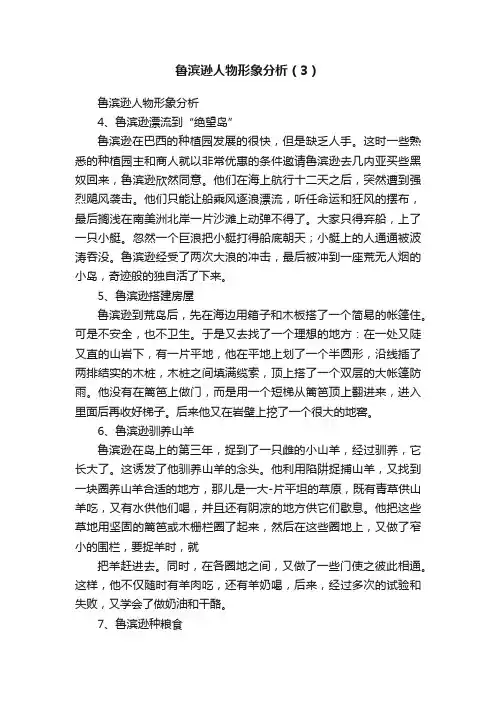
鲁滨逊人物形象分析(3)鲁滨逊人物形象分析4、鲁滨逊漂流到“绝望岛”鲁滨逊在巴西的种植园发展的很快,但是缺乏人手。
这时一些熟悉的种植园主和商人就以非常优惠的条件邀请鲁滨逊去几内亚买些黑奴回来,鲁滨逊欣然同意。
他们在海上航行十二天之后,突然遭到强烈飓风袭击。
他们只能让船乘风逐浪漂流,听任命运和狂风的摆布,最后搁浅在南美洲北岸一片沙滩上动弹不得了。
大家只得弃船,上了一只小艇。
忽然一个巨浪把小艇打得船底朝天;小艇上的人通通被波涛吞没。
鲁滨逊经受了两次大浪的冲击,最后被冲到一座荒无人烟的小岛,奇迹般的独自活了下来。
5、鲁滨逊搭建房屋鲁滨逊到荒岛后,先在海边用箱子和木板搭了一个简易的帐篷住。
可是不安全,也不卫生。
于是又去找了一个理想的地方:在一处又陡又直的山岩下,有一片平地,他在平地上划了一个半圆形,沿线插了两排结实的木桩,木桩之间填满缆索,顶上搭了一个双层的大帐篷防雨。
他没有在篱笆上做门,而是用一个短梯从篱笆顶上翻进来,进入里面后再收好梯子。
后来他又在岩壁上挖了一个很大的地窖。
6、鲁滨逊驯养山羊鲁滨逊在岛上的第三年,捉到了一只雌的小山羊,经过驯养,它长大了。
这诱发了他驯养山羊的念头。
他利用陷阱捉捕山羊,又找到一块圈养山羊合适的地方,那儿是一大-片平坦的草原,既有青草供山羊吃,又有水供他们喝,并且还有阴凉的地方供它们歇息。
他把这些草地用坚固的篱笆或木栅栏圈了起来,然后在这些圈地上,又做了窄小的围栏,要捉羊时,就把羊赶进去。
同时,在各圈地之间,又做了一些门使之彼此相通。
这样,他不仅随时有羊肉吃,还有羊奶喝,后来,经过多次的试验和失败,又学会了做奶油和干酪。
7、鲁滨逊种粮食鲁滨逊偶然翻到一只小布袋,布袋里装了一些谷物,是用来喂家禽的。
袋里剩下的一点谷类早已被老鼠吃光了,只留下一些尘土和谷壳。
他就顺手把袋里的尘土和谷壳抖在岩石下的`围墙边。
不料一个月之后,地上竟长出了绿色的茎干,原来是大麦和稻子!他非常惊喜,就开始学习种田,并很快成了种田好手。
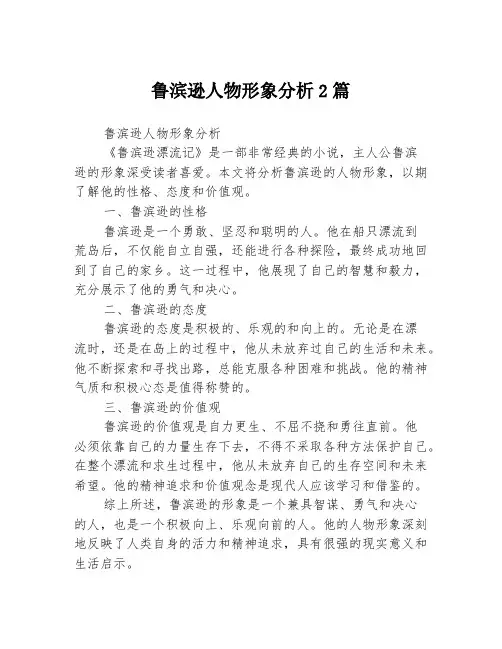
鲁滨逊人物形象分析2篇
鲁滨逊人物形象分析
《鲁滨逊漂流记》是一部非常经典的小说,主人公鲁滨
逊的形象深受读者喜爱。
本文将分析鲁滨逊的人物形象,以期了解他的性格、态度和价值观。
一、鲁滨逊的性格
鲁滨逊是一个勇敢、坚忍和聪明的人。
他在船只漂流到
荒岛后,不仅能自立自强,还能进行各种探险,最终成功地回到了自己的家乡。
这一过程中,他展现了自己的智慧和毅力,充分展示了他的勇气和决心。
二、鲁滨逊的态度
鲁滨逊的态度是积极的、乐观的和向上的。
无论是在漂
流时,还是在岛上的过程中,他从未放弃过自己的生活和未来。
他不断探索和寻找出路,总能克服各种困难和挑战。
他的精神气质和积极心态是值得称赞的。
三、鲁滨逊的价值观
鲁滨逊的价值观是自力更生、不屈不挠和勇往直前。
他
必须依靠自己的力量生存下去,不得不采取各种方法保护自己。
在整个漂流和求生过程中,他从未放弃自己的生存空间和未来希望。
他的精神追求和价值观念是现代人应该学习和借鉴的。
综上所述,鲁滨逊的形象是一个兼具智谋、勇气和决心
的人,也是一个积极向上、乐观向前的人。
他的人物形象深刻地反映了人类自身的活力和精神追求,具有很强的现实意义和生活启示。
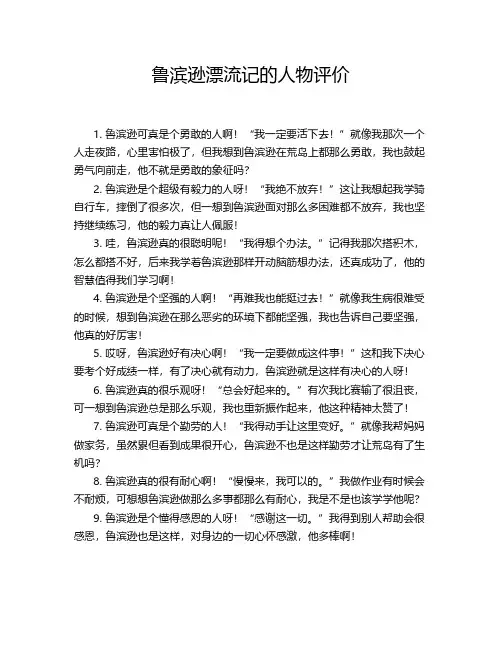
鲁滨逊漂流记的人物评价1. 鲁滨逊可真是个勇敢的人啊!“我一定要活下去!”就像我那次一个人走夜路,心里害怕极了,但我想到鲁滨逊在荒岛上都那么勇敢,我也鼓起勇气向前走,他不就是勇敢的象征吗?2. 鲁滨逊是个超级有毅力的人呀!“我绝不放弃!”这让我想起我学骑自行车,摔倒了很多次,但一想到鲁滨逊面对那么多困难都不放弃,我也坚持继续练习,他的毅力真让人佩服!3. 哇,鲁滨逊真的很聪明呢!“我得想个办法。
”记得我那次搭积木,怎么都搭不好,后来我学着鲁滨逊那样开动脑筋想办法,还真成功了,他的智慧值得我们学习啊!4. 鲁滨逊是个坚强的人啊!“再难我也能挺过去!”就像我生病很难受的时候,想到鲁滨逊在那么恶劣的环境下都能坚强,我也告诉自己要坚强,他真的好厉害!5. 哎呀,鲁滨逊好有决心啊!“我一定要做成这件事!”这和我下决心要考个好成绩一样,有了决心就有动力,鲁滨逊就是这样有决心的人呀!6. 鲁滨逊真的很乐观呀!“总会好起来的。
”有次我比赛输了很沮丧,可一想到鲁滨逊总是那么乐观,我也重新振作起来,他这种精神太赞了!7. 鲁滨逊可真是个勤劳的人!“我得动手让这里变好。
”就像我帮妈妈做家务,虽然累但看到成果很开心,鲁滨逊不也是这样勤劳才让荒岛有了生机吗?8. 鲁滨逊真的很有耐心啊!“慢慢来,我可以的。
”我做作业有时候会不耐烦,可想想鲁滨逊做那么多事都那么有耐心,我是不是也该学学他呢?9. 鲁滨逊是个懂得感恩的人呀!“感谢这一切。
”我得到别人帮助会很感恩,鲁滨逊也是这样,对身边的一切心怀感激,他多棒啊!10. 鲁滨逊绝对是个有信念的人!“我相信我能做到。
”就像我决定要做好一件事时,心里那种坚定,鲁滨逊不就是靠着坚定的信念才生存下来的吗?我觉得他就是我们的榜样!我觉得鲁滨逊漂流记里的鲁滨逊就是一个非常了不起的人物,他的各种品质都值得我们去学习和借鉴,能给我们很多的启发和鼓励。
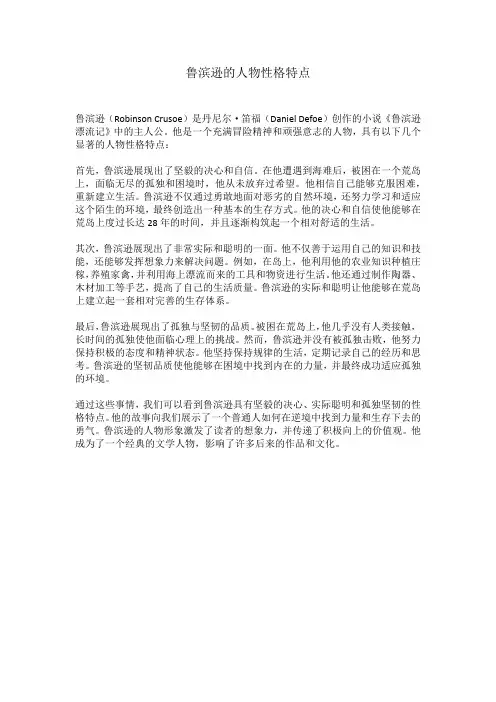
鲁滨逊的人物性格特点鲁滨逊(Robinson Crusoe)是丹尼尔·笛福(Daniel Defoe)创作的小说《鲁滨逊漂流记》中的主人公。
他是一个充满冒险精神和顽强意志的人物,具有以下几个显著的人物性格特点:首先,鲁滨逊展现出了坚毅的决心和自信。
在他遭遇到海难后,被困在一个荒岛上,面临无尽的孤独和困境时,他从未放弃过希望。
他相信自己能够克服困难,重新建立生活。
鲁滨逊不仅通过勇敢地面对恶劣的自然环境,还努力学习和适应这个陌生的环境,最终创造出一种基本的生存方式。
他的决心和自信使他能够在荒岛上度过长达28年的时间,并且逐渐构筑起一个相对舒适的生活。
其次,鲁滨逊展现出了非常实际和聪明的一面。
他不仅善于运用自己的知识和技能,还能够发挥想象力来解决问题。
例如,在岛上,他利用他的农业知识种植庄稼,养殖家禽,并利用海上漂流而来的工具和物资进行生活。
他还通过制作陶器、木材加工等手艺,提高了自己的生活质量。
鲁滨逊的实际和聪明让他能够在荒岛上建立起一套相对完善的生存体系。
最后,鲁滨逊展现出了孤独与坚韧的品质。
被困在荒岛上,他几乎没有人类接触,长时间的孤独使他面临心理上的挑战。
然而,鲁滨逊并没有被孤独击败,他努力保持积极的态度和精神状态。
他坚持保持规律的生活,定期记录自己的经历和思考。
鲁滨逊的坚韧品质使他能够在困境中找到内在的力量,并最终成功适应孤独的环境。
通过这些事情,我们可以看到鲁滨逊具有坚毅的决心、实际聪明和孤独坚韧的性格特点。
他的故事向我们展示了一个普通人如何在逆境中找到力量和生存下去的勇气。
鲁滨逊的人物形象激发了读者的想象力,并传递了积极向上的价值观。
他成为了一个经典的文学人物,影响了许多后来的作品和文化。
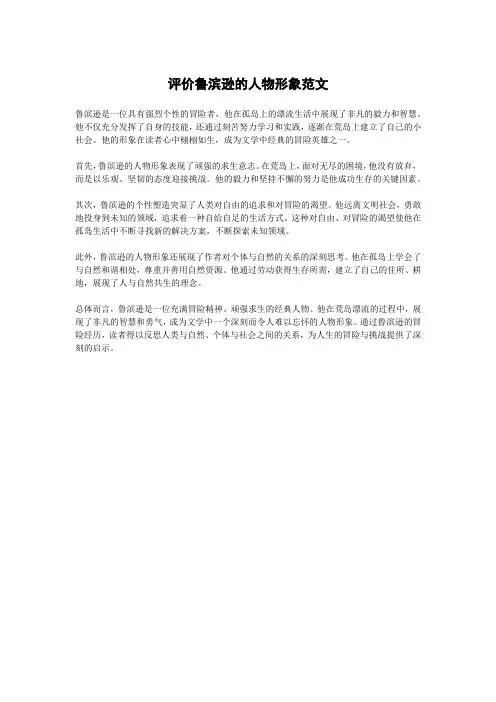
评价鲁滨逊的人物形象范文
鲁滨逊是一位具有强烈个性的冒险者,他在孤岛上的漂流生活中展现了非凡的毅力和智慧。
他不仅充分发挥了自身的技能,还通过刻苦努力学习和实践,逐渐在荒岛上建立了自己的小社会。
他的形象在读者心中栩栩如生,成为文学中经典的冒险英雄之一。
首先,鲁滨逊的人物形象表现了顽强的求生意志。
在荒岛上,面对无尽的困境,他没有放弃,而是以乐观、坚韧的态度迎接挑战。
他的毅力和坚持不懈的努力是他成功生存的关键因素。
其次,鲁滨逊的个性塑造突显了人类对自由的追求和对冒险的渴望。
他远离文明社会,勇敢地投身到未知的领域,追求着一种自给自足的生活方式。
这种对自由、对冒险的渴望使他在孤岛生活中不断寻找新的解决方案,不断探索未知领域。
此外,鲁滨逊的人物形象还展现了作者对个体与自然的关系的深刻思考。
他在孤岛上学会了与自然和谐相处,尊重并善用自然资源。
他通过劳动获得生存所需,建立了自己的住所、耕地,展现了人与自然共生的理念。
总体而言,鲁滨逊是一位充满冒险精神、顽强求生的经典人物。
他在荒岛漂流的过程中,展现了非凡的智慧和勇气,成为文学中一个深刻而令人难以忘怀的人物形象。
通过鲁滨逊的冒险经历,读者得以反思人类与自然、个体与社会之间的关系,为人生的冒险与挑战提供了深刻的启示。
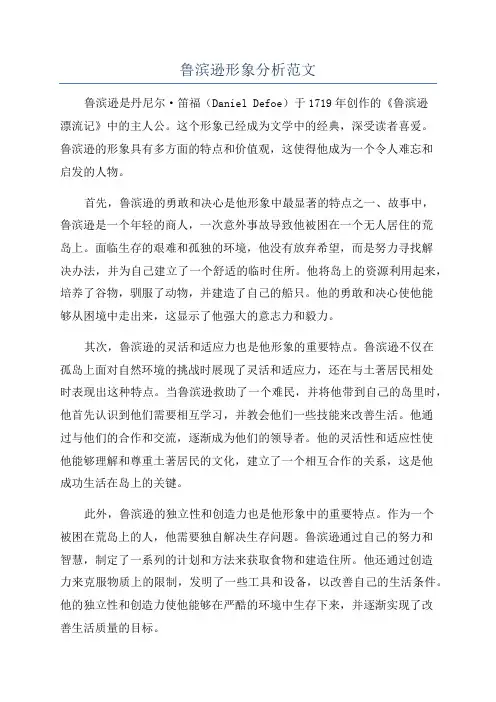
鲁滨逊形象分析范文鲁滨逊是丹尼尔·笛福(Daniel Defoe)于1719年创作的《鲁滨逊漂流记》中的主人公。
这个形象已经成为文学中的经典,深受读者喜爱。
鲁滨逊的形象具有多方面的特点和价值观,这使得他成为一个令人难忘和启发的人物。
首先,鲁滨逊的勇敢和决心是他形象中最显著的特点之一、故事中,鲁滨逊是一个年轻的商人,一次意外事故导致他被困在一个无人居住的荒岛上。
面临生存的艰难和孤独的环境,他没有放弃希望,而是努力寻找解决办法,并为自己建立了一个舒适的临时住所。
他将岛上的资源利用起来,培养了谷物,驯服了动物,并建造了自己的船只。
他的勇敢和决心使他能够从困境中走出来,这显示了他强大的意志力和毅力。
其次,鲁滨逊的灵活和适应力也是他形象的重要特点。
鲁滨逊不仅在孤岛上面对自然环境的挑战时展现了灵活和适应力,还在与土著居民相处时表现出这种特点。
当鲁滨逊救助了一个难民,并将他带到自己的岛里时,他首先认识到他们需要相互学习,并教会他们一些技能来改善生活。
他通过与他们的合作和交流,逐渐成为他们的领导者。
他的灵活性和适应性使他能够理解和尊重土著居民的文化,建立了一个相互合作的关系,这是他成功生活在岛上的关键。
此外,鲁滨逊的独立性和创造力也是他形象中的重要特点。
作为一个被困在荒岛上的人,他需要独自解决生存问题。
鲁滨逊通过自己的努力和智慧,制定了一系列的计划和方法来获取食物和建造住所。
他还通过创造力来克服物质上的限制,发明了一些工具和设备,以改善自己的生活条件。
他的独立性和创造力使他能够在严酷的环境中生存下来,并逐渐实现了改善生活质量的目标。
最后,鲁滨逊的冒险精神和渴望自由的愿望也是他形象中重要的特点之一、鲁滨逊冒着未知的风险离开家乡,寻求新的机会和冒险。
他在旅行中被困在了荒岛上,但他没有放弃他的自由和冒险精神,而是努力寻找解决办法,并建立了自己的临时家。
即使能够离开岛屿,鲁滨逊也发现自己渴望冒险和自由的生活,最终选择回到了岛上。
鲁滨逊人物分析1.从课文中看出鲁滨孙是一个怎样的人?鲁滨孙不是一个随遇而安、消极待命的人,而是一个意志品质极为坚强,生存信念十分执著的人,并且务实肯干,勤于创造。
他的一切行为,特别是他的思考过程,全是积极、主动的,都是为了更好地把握生存的机会,创造物质条件,调整生活心态。
要避免学生误以为鲁滨孙是运气好,只身落难荒岛又得到许多生活用品,活得自由自在,无拘无束。
应该充分注意到,鲁滨孙并不是在旅游,也不是在模拟生存挑战,他遭遇的是真实的海难,他打定主意一个人在岛上苦度余生。
他是在克服了极端的孤独、恐惧、艰苦,经过反复动摇之后,才终于理智地鼓起勇气,孤身创业的。
正因为这样,鲁滨孙才让人敬佩,值得学习。
2.鲁滨孙为什么要活下去?他是否值得这样活着?如果换一个人,在这样的绝境中,很可能就不想活了,因为想到自己一个人在孤岛上,迟早都是死,与其饿死、病死或老死,不如自杀而死──当然这是一种因为精神完全崩溃后导致的自杀行为。
鲁滨孙却没有这样做,他说服自己顽强地活着,并打定主意在岛上独自生活一辈子。
这需要巨大的勇气。
从这里可以看出鲁滨孙是一个非常珍惜生命、热爱生活的人。
他活着,也许并非为了什么,而仅仅因为自己是一条生命,既然是生命就应该善待它。
况且他活得积极,活得主动,活得像个人,活出了人的尊严。
像他这样的人值得活着。
3.如何理解鲁滨孙的记日记和阅读《圣经》及其他祈祷书的行为?人们记日记往往是为了记录生活,抚慰心灵。
日记总是面对自我而非他人。
鲁滨孙记日记的行为,表明他作为一个文明人精神方面的需要,证明自己活得明白,在时间的长河里没有走失。
西方人普遍面临的一个精神问题是人与上帝的关系。
在这种荒岛上,人更有理由相信上帝的存在(在这部名著里多次提到《圣经》及鲁滨孙对上帝的祈祷)。
有了这个前提,鲁滨孙就有了活下去的精神支柱。
其实谁都需要有精神支柱,才活得有理由,活得有意义。
4.鲁滨孙的自我安慰与阿Q的“精神胜利法”有什么区别?这是不是一种逃避现实的表现?鲁滨孙在那样的环境中,上天无路,入地无门,他能理智地分析自己目前所处的困境,是一种冷静的表现,是人类理性思维的胜利。
《鲁宾逊漂流记》中主人公的分析《鲁宾逊漂流记》是英国作家丹尼尔•笛福于1719年创作的一部长篇小说。
小说通过讲述主人公鲁宾逊漂流到荒岛上的经历,展现了一个人在困难、险恶的环境中生存、努力和抗争的故事。
鲁宾逊是一个充满勇气、智慧和毅力的冒险家,他在孤岛上过着自给自足的生活,同时也反映了一个人在孤独和困境中的心理变化。
首先,鲁宾逊具有强烈的冒险精神。
他渴望冒险,不甘于平凡的生活。
在小说一开始,鲁宾逊的父亲希望他过上稳定、安逸的生活,但鲁宾逊内心深处对于冒险的渴望无法抑制。
他执意出海,结果遭遇了海难并漂流到荒岛上。
这表明鲁宾逊对冒险的追求是他内心深处一种强烈的动力,他愿意冒险去探索未知的世界。
其次,鲁宾逊展现出了非凡的智慧和创造力。
在孤岛上,他利用自己的聪明才智和丰富的生活经验,克服了许多困难,建造了一个自给自足的生活体系。
他建造了一个舒适的住所,种植了各种农作物,养殖了动物,制作并修理了工具和武器。
他甚至还救助了一个土著人,并重新组织了部落的生活。
所有这些都展示了鲁宾逊在荒岛上的智慧和创造力,他不仅仅是一个普通的漂流者,更像是一个真正的生存专家。
此外,鲁宾逊的漂流经历也反映了一个人在孤独环境中的心理变化。
在刚开始的时候,鲁宾逊感到孤独和绝望,但随着时间的推移,他逐渐适应了孤独生活,并开始思考自己的存在和目标。
他开始反省自己以往的生活,认识到他过去的冒险是出于虚荣心和傲慢,并决定过上简单、自给自足的生活。
这种变化表明,鲁宾逊在孤岛上经历了内心的蜕变,从一个冒险家转变为一个更加成熟、深思熟虑的人。
然而,鲁宾逊的孤岛生活并不完美。
尽管他过上了相对自足的生活,但他仍然感到内心的空虚和渴望回到文明社会的冲动。
他曾多次试图离开孤岛回到家乡,但总是失败或面临重大困难。
这种对回到文明社会的渴望表明,鲁宾逊虽然在孤岛上获得了自由和独立,但他仍然渴望人际关系和社交。
总之,《鲁宾逊漂流记》中的主人公鲁宾逊展现了勇气、智慧和毅力的特质。
《鲁宾逊漂流记》人物性格特点分析摘要:本文用理解分析的方法,从人物性格特点的角度,阐明了鲁滨逊所具有的精神品质,及其人物形象特点。
关键词:冒险;探索;追求目录一、背景二、内容简介三、人物性格特点1.冒险精神2.追求,探索精神四、小结一、背景随着《马可波罗游记》在欧洲的广泛传播,欧洲人开始渴望东方的财富,于是,引发了一场新航路的开辟热潮。
随着新航路的开辟,欧洲各国开始建立自己在海外的殖民地,各地贸易往来频繁,贩卖黑奴的三角贸易盛行,这给欧洲带来了巨额财富。
《鲁宾逊漂流记》成书于1719年,此时英国已经确立了其海上霸主的地位,资本主义处于早期原始积累阶段,冒险精神盛行。
二、内容简介出身中产阶级的鲁滨逊自幼就立下了出海远航遨游的愿望。
他不顾父母的劝阻,毅然在家人不知情的情况下开始了自己的冒险生涯。
在他第一次出海航行时便遇到了可怕的风暴。
在恐惧时,他曾发誓只要自己活着度过危险就一定回家和父母好好的生活,但,危险过去后,他便又忘记了自己的誓言,执迷不悟的进行下一次的远航。
他发现到非洲做生意很容易,便几次前往,终于遇到了海盗,被俘成为奴隶。
两年后,他终于找到机会逃了出来,在海上航行了一些日子,被一艘开往巴西的船救起,到了巴西后,他卖掉了自己的物品和一个跟随自己的小奴隶,用得到的钱买下一个种植园,开始经营自己舒适的生活。
天性喜爱冒险的鲁滨逊并不安于现状的舒适,在一些朋友的劝导下,他再一次前往非洲贩卖黑奴,这一次的航行给他的生活带来了莫大的改变。
他们的船在南美洲附近沉没,鲁滨逊成为了唯一幸存下来的人,独自流落到一个与世隔绝的荒岛上。
为了能够在这里生存,他开始了自己充满着创造性的生活。
他为自己建造了两个舒适的家,尝试着种水稻,大麦,饲养野山羊,并且,他也自己烧制陶器,制作面包,甚至凿制独木舟,开挖运河等。
时间一天天的过去了,一天,鲁滨逊发现一群野蛮人来到他的小岛,后来,他从野蛮人的手中救出一个人,取名星期五。
他成为了鲁宾逊的仆人和很好的朋友。
《鲁滨孙漂流记》人物分析读书笔记《鲁滨孙漂流记》出版于1720xx年4月25日。
该小说发表多年后,被译成多种文字广为流传于世界各地,下面是橙子为你们整理的关于《鲁滨孙漂流记》人物分析读书笔记的内容,希望你们喜欢。
《鲁滨孙漂流记》读书笔记一【主要人物】鲁宾逊【性格特点】鲁宾孙是一个充满劳动热情的人,伟大的人,坚毅的人,乐观的人,勤劳的人,不因为苦难而向命运屈服的人.孤身一人在这荒无人烟的孤岛上生活了20xx年。
面对人生困境,鲁滨孙的所作所为,显示了一个硬汉子的坚毅性格与英雄本色,体现了资产阶级上升时期的创造精神和开拓精神,他敢于同恶劣的环境作斗争.同时他还有坚定的意志与恒心和改变一切的信心,他相信天不会塌下来,鲁滨孙又是个资产者和殖民者,因此具有剥削掠夺的本性。
【主要人物】星期五【性格特点】星期五是被族人当成祭祀品带回到原来的部落。
随著这段朝夕相处的日子,鲁宾逊因这个土著而改变了自己。
也由于他们之间的友谊他才得以存活下去,不幸的是星期五最后被奴隶贩子射杀,鲁宾逊在两年的流浪生涯之后带著这段友谊的怀念及一个全新的自己回到了家乡。
并回到了世界。
星期五是一个朴素的人,忠诚的朋友,智慧的勇者。
他知恩图报,忠诚有责任心,适应能力强,他和鲁1/ 8宾逊合作着施展不同的技能在岛上度过了多年。
“星期五”本是个野人,是勤劳、对人真诚的人,被鲁滨孙从土著人手中解救并教化后,又成了他忠实的仆人和朋友,成了“文明人”的奴隶。
《鲁滨逊漂流记》(又译为《鲁滨孙漂流记》)是英国作家丹尼尔·笛福的一部小说作品,主要讲述了主人公鲁滨逊因出海遇难,漂流到无人小岛,并坚持在岛上生活,最后回到原来所生活的社会的故事。
该书首次出版于1720xx年4月25日。
该小说发表多年后,被译成多种文字广为流传于世界各地,并被多次改编为电影《鲁滨逊漂流记》、电视剧《鲁滨逊漂流记》。
创作背景本部小说是笛福受当时一个真实故事的启发而创作的。
1720xx年9月一名叫亚历山大·塞尔柯克的苏格兰水手在海上与船长发生争吵,被船长遗弃在南美洲大西洋中,生活在离智利400英里之遥的安·菲南德岛上达4年4月之久,四年后他被伍兹·罗杰斯船长所救。
鲁滨孙漂流记人物评价及依据
《鲁滨逊漂流记》中,鲁滨逊是一个充满冒险精神、拥有惊人毅力和丰富创造精神的人。
他永不安于安稳平静的生活,在孤岛上生活了28年,充分显示了他的冒险精神。
即使流落荒岛,他也绝不气馁,克服了常人无法想象的困难,以惊人的毅力顽强地度过了在岛上28年之久。
这显示了一个硬汉子的坚毅、勇敢、机智的性格。
同时,鲁滨逊也是一个自信、善于自我反省、懂得感恩的人。
他的自信,不是任意的凭感觉和感情产生的,而是在他确立目标时,通过审慎的思考和调查,通过预测可以达到成功的准备中产生的。
以上评价依据来源于鲁滨逊的冒险经历和他在荒岛上的生存体验。
同时,笛福所生活的时代背景也对鲁滨逊这一角色的塑造产生了影响。
在英国资本主义开始大规模发展的年代,笛福塑造了鲁滨逊这一正面人物形象,他敢于同恶劣的环境作斗争,具有资产阶级上升时期的创造精神和开拓精神。
此外,鲁滨逊的伙伴星期五也是作品中的重要角色。
他是一个朴素的人,忠诚的朋友,智慧的勇者,孝顺的儿子。
他知恩图报,忠诚有责任心,适应能力强。
星期五的存在丰富了作品的人物性格和情节发展。
以上评价均来源于作品中人物的性格特征和行为表现,以及作品创作的社会背景和影响。
通过对这些方面的分析,可以全面地评价《鲁滨逊漂流记》中的人物形象。
鲁滨逊人物形象剖析近三百年来,《鲁滨孙漂流记》向来风靡全世界,成为世界文学史上不朽的名著。
它的魅力安在呢?应当说,这归功于笛福成功地塑造了鲁滨逊这个极具个性色彩的人物。
在鲁滨孙那边,冒险、坚毅、毅力、智慧、勇气、英勇、富于进步、开辟创新全都集于一身,为全部不甘平庸,不安于现状的人们供给了他们心中所寄望的英豪形象。
第一,鲁滨孙是一个不本分的冒险者。
在家中,父辈全部的希望全都放在了鲁滨孙一个人身上。
父亲要求儿子老老实实地靠自己的勤恳和努力挣一份家财,过一辈子安闲而舒适的生活。
但是这个孩子游览四海的念想从没有改变过。
于是,他背着家庭,擅自出海,只管道路崎岖,但是最后一种“神奇而有力的天数经常逼着我们自寻死路,使我们明显看见眼前是死路,仍是要冲上去。
”感情战胜了理智。
在鲁滨孙看来,没有比冒险和开辟进步更刺激和气玩的事情了。
忽然成为巨富,和老婆、孩子的家庭之乐,光阴催人老的无情,这全部依旧难以阻拦鲁滨孙的步伐。
侄儿的劝告,可是是鲁滨孙乘机而动的诱因,真切的原动力仍旧是他不习惯平庸生活、无心安闲生活的所致。
这样,鲁滨孙开始了新一轮的冒险历程。
第二,鲁滨孙是一个英勇的实践者。
《鲁滨孙漂流记》中最出色的一段莫过于他在岛上生活的日子。
人们常言,人生不如意事者十之八九。
若我们有时机置身于几近与世隔断的孤岛,那么就能够体验生计的极限终究有多大,自己蒙受的压力终究能达到何种程度。
鲁滨孙不是一个想象家,也非在困难眼前悲观作为的胆小鬼。
他着重的是实质,关注的是自己的生计。
于是,在28 年的孤岛生活中,生计成了他整天彻夜“劳心劳力”的主题。
搬运船上用品、创建住所、驯养山羊、种麦植稻、置办桌椅、烤制面包等等,都在他的手脚并用中施睁开来。
不论是在肉体上仍是在精神上,他都在为知足的欢乐而努力、而奋斗。
苦变为了乐,艰辛成为了享受,有什么不可以战胜的,有什么不可以做到的呢?认真读读鲁滨孙制作面包的情节吧,在那边我们能够领会到人类的精良,人类的智慧和人类的创建,能够证明“人类的活动能够获得什么样的成就!”故而,在《鲁滨孙漂流记》里,我们读到的是一个奋斗者的拼搏心声,看到的是一个开辟者的奋斗踪迹。
The Characters of the Emerging bourgeoisie revealed in Robinson CrusoeAbstract: Robinson Crusoe, based on a real fact, successfully creates a hero, an empire builder, and a super man. The author Defoe, because of this book, becomes the father of English realistic novel. People like to talk about Robinson Crusoe, with his adventure and everything he had done when he was facing the obstacles. To some people, Robinson is a hero, a giant, and perfect in all aspects. While some other people think that Robinson is the one who struggles only for property. This paper deals with him as an emerging bourgeoisie. In this way, all his behavior seems more reasonable.Key words: adventure, property, material civilizationRobinson Crusoe is a classic adventure novel. In this novel, the spirit of adventure of the emerging bourgeoisie is highly praised. Robinson Crusoe, born as an emerging bourgeoisie, refusing to inherit property from his father, decides to leave his middle station family and begins his new adventurous life.The motive of his adventure, as he first tells her mother “that my thoughts were so entirely bent upon seeing the world”(Daniel Defoe,Robinson Crusoe, 5) [1] or as some people believes he is driven by his romantic ideas. However, there are neither any descriptions of his appreciation of the scenery nor any entertaining activities. Actually, in the 18th century, the word “adventure” does not refer to the impulse of romance to a large extent, but it refers to a fanatical pursuit of profit. [2] So the desire of Robinson’s adventure clearly reveals his willingness of getting more profit. Driven by this powerful force, he leaves his family although his father gives him serious and counsel against what he foresees is Robison’s design. Robinson is not a real adventurer; he leaves his family just because he is not satisfied with the current situation of his middle station family. He was not willing to stick to the old doctrines and lives a life of leisure and ease. And it is it that causes him to go out to sea three times to do business, even after he has established his plantation in Brazil.“That evil influence which carried me first away from my father’s house, that hurried me into the wild and indigested notion of raising my fortune, and that impressed those conceits so forcibly upon me as make me deaf to all good advice and to the entreaties and even command of my father” (Daniel Defoe, Robinson Crusoe, 18). After the first accident, even Robinson is thrilled and feels regretful for a while, but this “evil influence” still supports him and makes him keep going sailing. This is only from one aspect, and in his later experience, we can see it more clearly. Once, he meets a captain and treats him as his good friend because from the captain he can learn a lot and “increased very considerably” as well as become “both a sailor and a merchant”(Daniel Defoe, Robinson Crusoe, 20). Later in another voyage, “I did not carry quite £100 of my new-gained wealth, so that I had £200 left, and which I lodged withmy friend’s widow, who was very just to me”. Robinson’s principle of judging person is totally different from most of the people, his never changed principle is “pursuing property”. It is suitable for the friendship between the captain and him and it goes the same with the relationship between him and anybody else.Besides, it is hard to find his emotional attachment to any body. Between all the lines of the book, he talks a little about his parents and his family in the first few pages. During those 28 years living alone on the isolated island, he never thinks of his old friends or his parents (if his seldom thinking of his father’s good counsel is not included when he is frustrated). What he mentions most is his individual life and his hardworking on the island. He focuses on his fighting for a better life and the things he wants to possess.What impresses the readers most is Robinson’s experience on the island. For the first few years, he is all alone there and lives a miserable life. But he never gives up hope and complains about his fate. Instead, he tries his best to struggle for a better living condition. Luckily, he gets enough necessities including food and tools from the wreck of the ship. “how well I was furnished for my subsistence and what would have been my case if it had not been happened, which was a hundred thousand to one, that the ship floated from the place where she first struck and was driven so near to the shore that I had time to get all these things out of her”(Daniel Defoe,Robinson Crusoe, 78) This suggests that Robinson does not get rid of the material civilization. He doesn’t lives like a savage. With the aid of the tools, he builds up his living places, plants enough food for himself, hunts wild animals or domesticates them, manufactures tools and sewing clothes. After a series of struggle, everything on his island becomes in good order and all within his control. A once deserted island begins to prosper. Even Robinson himself can’t imagine, what will his life be like. His life on the isolated island reveals the shining characters of bourgeoisie in a rising stage. He is a hard working man. Robinson had shown his marvelous capacity for work, his boundless energy and persistence in overcoming obstacles. His perseverance in spending months making a canoe, and in practicing pottery making until he got it right, is praiseworthy. Additionally, his resourcefulness in building a shelter, dairy, grape arbor, country house, goat stable is remarkable. He struggled hard against nature and made it bend to his will. Robinson has set a good model for us. Anyway, although he left the society, his behaviors reflect a lot of characters of emerging bourgeoisie.At last, Robinson is nonetheless very interested in possessions, power and prestige. After the island was peopled, he thinks he is “very rich in subjects”, and he thinks “how like a king I looked. First of all, the whole country was my own mere property; so that I had an undoubted right of dominion. Secondly, my people were perfectly subjected: I was absolute lord and law giver; they all owed their lives to me, and every ready to lay down their lives…”(Daniel Defoe,Robinson Crusoe, 320) Meanwhile, he is cold and detached when it comes to his family and marriage. “ forfirst of all I married, and that not either to my disadvantage or dissatisfaction, and had three children, two sons and one daughter. But my wife dying…” He states all these facts in a brief and cold way, and it makes a great comparison with his detailed procedures of making tools on the island. So a conclusion can be drawn, it is always true to Robinson that the power and property is the perpetual theme in his life. He will never get rid of material civilization. Emotional attachment is not a necessity in his life.In a word, Robinson represents the bourgeoisie in the rising stage in English society. So his spirit of adventure, or to be more specific, the pursuit of property, his perseverance when faced obstacles, and his cold attitude toward relationships between people inevitably reveal the characters of the Emerging bourgeoisie of that age. In this novel, Defoe successfully gives us a fascinating glimpse into the complicated modern society in England of the 18th century.References:[1] Daniel Defoe, Robinson Crusoe,外语教学与研究出版社,2007.2[2] 黄梅,推敲“自我”:小说在十八世纪的英国,生活﹒读书﹒新知三联书店,2003.5。